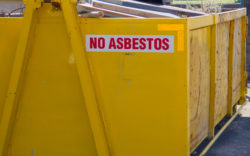Top Class Actions’s website and social media posts use affiliate links. If you make a purchase using such links, we may receive a commission, but it will not result in any additional charges to you. Please review our Affiliate Link Disclosure for more information.

Even if a proper asbestos disposal container is used, it is illegal for asbestos dumping to be conducted if correct procedure is not followed. A recent example of asbestos dumping occurred in Montana, with an asbestos disposal company suing the state’s environmental officials for allegedly failing to adhere to properly respond to asbestos dumping health risks.
Butte-based Ingraham Environmental is named as the primary plaintiff in this asbestos dumping lawsuit. The company claims the state’s Department of Environmental Quality had ordered the deadly material to be dumped in landfills.
This asbestos dumping poses a serious public health risks to the landfill employees, with Montana’s regulations stricter than federal standards in terms of asbestos disposal.
The DEQ points out Montana’s asbestos disposal regulations require that the material be treated much more cautiously than ordinary waste, but the primary party responsible for compliance is the building owner. According to DEQ attorneys involved in this asbestos dumping lawsuit, this accountability could also apply to the landfill operators.
DEQ public policy director Kristi Ponozzo told the Great Falls Tribune the agency was working to address the allegedly illegal asbestos dumping. The agency has set up an asbestos advisory group to improve compliance with state and federal asbestos dumping last year.
However, the DEQ attorneys argued that they were not legally required to act more aggressively than they did when enforcing asbestos disposal requirements.
Overview of Asbestos Health Concerns
Montana has had a history of asbestos problems in the past, with the residents of Libby bearing the brunt of health problems related to asbestos exposure. Health officials stated that the asbestos fibers came from asbestos-containing vermiculite, which had allegedly resulted in the deaths of hundreds of residents and asbestos illness in others.
One of the primary concerns associated with asbestos exposure is asbestos lung disease, in which the fibers attach and embedded themselves into the lungs. After a long period of dormancy which can last up to 35 years, the fibers can potentially create inflammation which in turn can be the catalyst for cancer.
While the primary cause of lung cancer is smoking, approximately 4,800 deaths are caused by asbestos lung cancer each year. Asbestos is harmless when dormant, but can be potentially inhaled or swallowed once released into the air.
This makes asbestos disposal potentially dangerous to public health, which is why it is vital for officials and contractors to follow these regulations.
The vermiculite mentioned reportedly came from a W.R. Grace mine, which was used to produce Zonolite insulation for decades and was sold throughout the state of Montana and elsewhere.
According to the U.S. Environmental Protection Agency (EPA), over $575 million was spent cleaning up nearly 2,500 resident and commercial properties around Libby and nearby areas.
However, there has been little effort done to address other asbestos problems developing in the state. Ingraham alleges the illegal asbestos dumping is posing public health risks for employees working in the landfill, demolition or construction.
Ingraham further states that it wants DEQ to be held accountable for not allegedly not properly dealing this asbestos dumping.
Do YOU have a legal claim? Fill out the form on this page now for a free, immediate, and confidential case evaluation. The attorneys who work with Top Class Actions will contact you if you qualify to let you know if an individual asbestos lawsuit or asbestos class action lawsuit is best for you. [In general, asbestos lung cancer lawsuits are filed individually by each plaintiff and are not class actions.] Hurry — statutes of limitations may apply.
ATTORNEY ADVERTISING
Top Class Actions is a Proud Member of the American Bar Association
LEGAL INFORMATION IS NOT LEGAL ADVICE
Top Class Actions Legal Statement
©2008 – 2024 Top Class Actions® LLC
Various Trademarks held by their respective owners
This website is not intended for viewing or usage by European Union citizens.
Get Help – It’s Free
Join a Free Asbestos Lung Cancer Class Action Lawsuit Investigation
If you or a loved one were exposed to asbestos and developed mesothelioma, lung cancer, or cancer in the lining of the lungs, abdomen or chest cavity, you may be able to take legal action against the companies responsible. Don’t delay – in most states the statute of limitations is two years to file an asbestos lawsuit after you’re diagnosed. Obtain a free and confidential case evaluation be filling out the form below.
An attorney will contact you if you qualify to discuss the details of your potential case at no charge to you.
Please Note: If you want to participate in this investigation, it is imperative that you reply to the law firm if they call or email you. Failing to do so may result in you not getting signed up as a client, if you qualify, or getting you dropped as a client.
Oops! We could not locate your form.












